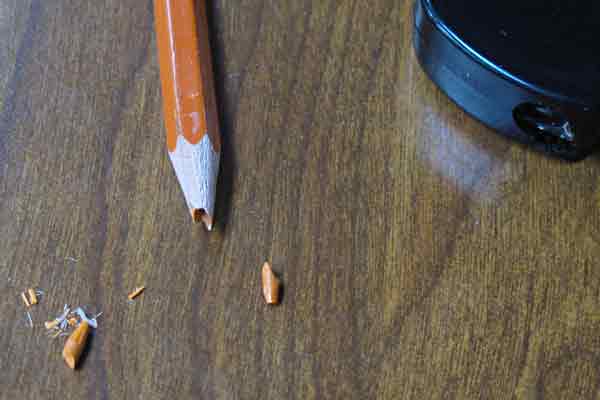
Broken Pencil Lead
We are coloring a picture together. “Can you sharpen this orange for me?” you ask, handing me a colored pencil. The end is dull and so I put it into the sharpener. Twist, twist—oh no, the lead broke off inside! “I can fix it,” you say. Soon the broken piece comes out and we start over. Twist, twist—not quite enough—twist, twist. Now it is almost sharp, but look! “The lead is wiggly,” you say. “See? It pulls right out.” We look at the pieces of orange lead, disappointed.
This pencil was probably dropped before, so the lead inside is all broken. “I guess we can’t use it,” you say. It won’t work for coloring, but I think we can learn a good lesson. “Not to drop pencils?” you suggest. Yes, it is easy to forget that they are fragile inside. But even more important, we don’t often think about how hurtful our words can be to others. Just like dropping a pencil will break the inside of it, if we say unkind words to someone we are actually breaking something inside of them.
Remember the verse about a “broken spirit”? Proverbs 17:22 says, “A merry heart doeth good like a medicine; but a broken spirit drieth the bones.” Have you noticed how our brothers and sisters are blessed when we have a merry, or cheerful, heart? But what about when we start saying, “You are too little” or “I’ll tell Mama if you do that”? It is easy to be thoughtless and selfish, just like it is easy to let a pencil roll off the table. Then, suddenly, brother or sister’s attitude becomes grouchy and irritable. Why aren’t they being nice? You wonder. Maybe you try to get them to “shape up,” but it only gets worse—just like the pencil lead that keeps breaking. What has happened? You broke something inside them—their sense of being loved and wanted—and now they don’t trust you.
Do you want to be someone who hurts others with your words? Do you want to be someone whom others can’t trust? I don’t either. What can we do when someone’s spirit is broken and we caused the problem? First, we have to face our fault and be willing to humble down and apologize. That isn’t easy—unless we ask God to help us stop loving ourselves and be willing to lay down our desires to really love others. What does 1 John 3:16 tell us? What if God was always putting us down? Would we trust Him?
And second, let us follow what the Bible teaches about building others up. Each time we speak to others we have a choice—to nag and tear them down or encourage and build them up.